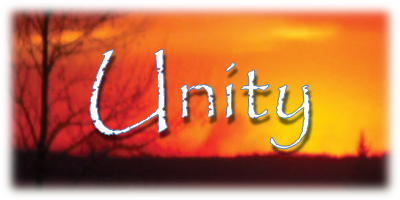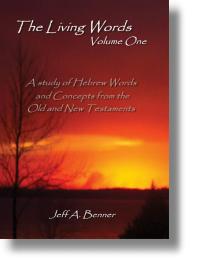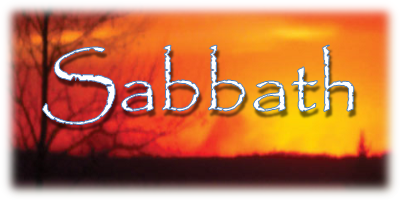Topics  The Living Words The Living Words 

The Living Words: Unity
This article is an xcerpt from Mr. Benner's book The Living Words.
The Hebrew word אחד ehhad [H:259] is often translated as "one," but a more Hebraic definition would be a "unit" as can be clearly observed in the following verse.
| Therefore a man will leave his father and mother and cling with his wife and they will be for a flesh unit (ehhad). Genesis 2:24 |
The Western mind sees "one" as only singular, void of any connection to something else. For instance, "one" man is an individual entity to himself, just as "one" tree is an entity to itself. To the Ancient Hebrew mind, nothing is "one," all things are dependent upon something else. A man is not "one," but a unity of body, bones, flesh, organs and blood. The man is also in unity with his wife and family as well as with the larger community. Even a tree is a unity of roots, trunk, branches, and leaves, which is also in unity with the surrounding landscape. "One" year is a unity of seasons.
The first use of ehhad is found in Genesis 1:5 where "evening" and "morning," two states of opposite function, are united to form "one" day.
| And there was evening and there was morning, one day. |
It should be noted the use of the Hebrew word ehhad in this verse is rather intriguing. Days two through seven are identified by their cardinal number-second, third, fourth, etc. The only exception to this is the "first" day which does not use the cardinal number ראשון rishon [H:7223] meaning "first" but instead uses the ordinal number ehhad. I am of the opinion this day is a summary of all of creation, a unity of the days of creation being expressed as the separation of light and darkness. The Hebrew mind does not view time in a linear fashion as we Westerners do but as cyclical. The seven days are not meant to be a "timeline" of events but a poetic description of God's work.
With all of this said, we do find the Hebrew word "ehhad" meaning "one" in the sense of individuality.
| And Elohiym said, the waters under the sky will be gathered to one (ehhad) place... Genesis 1:9 |
I have theorized in the Ancient Hebrew language there was another word to represent the ordinal number "one" and the word ehhad was solely used for a unit that exists within a unity. But over time, the original Hebrew word for "one" went into disuse and the word ehhad was used for a unit as well as the number "one." This would not be a unique occurrence, as languages are constantly evolving, words are dropped and added, and definitions and usages change over time. However, there are some textual evidences to support this theory.
The number twelve is written in Hebrew as עשר שני sheney asar, literally translated as "two ten." We would then expect eleven to be written as עשר אחד ehhad asar and we do find that in some verses, but we also find עשר עשתי ashtey asar such as in the following verse.
| And on the third day eleven bullocks... Numbers 29:20 (KJV) |
The word עשתי ashtey [H:6249] means "one" but is only used in the context of "eleven." It would appear ashtey was the original word for "one" but was replaced by ehhad.
How does all this relate to the two natures of man, the physical and the spiritual, such as we see in the following verse?
| Who shall ascend into the hill of the LORD? or who shall stand in his holy place? He that hath clean hands, and a pure heart; who hath not lifted up his soul unto vanity, nor sworn deceitfully. Psalm 24:3,4 (KJV) |
Our western mind perceives "clean hands" as physical and "pure heart" as spiritual, but what is "spiritual"? The dictionary defines this word as "Having the nature of spirit; not tangible or material" (Spiritual. Dictionary.com. The American Heritage Dictionary of the English Language, Fourth Edition. Houghton Mifflin Company, 2004). By definition, the "spiritual" is nonphysical, and since all Hebraic thought is founded in the physical, there is no such concept of "spiritual" in the Hebrew mind. The above passage is a Hebrew parallelism, expressing "one" idea in two (or more) different ways. To the Hebrew mind, clean hands (an idiom for innocence) are the same as a pure mind (also an idiom for innocence). The author is not creating a dichotomy of physical and spiritual but expressing innocence in two different ways.
| I and the father are one. John 10:30 (RSV) |
While the Greek text uses the word heis [G:1520] meaning "one" we must take our definition from the Hebrew word ehhad since he was speaking in
Hebrew and not Greek. What Yeshua is saying is he and the father work together as a unit, with the same purposes and goals. Yeshua also desired this same unity with his disciples as we see in his prayer to his father.
| That they may all be one (heis/ehhad); even as thou, Father, art in me, and I in thee, that they also may be in us, so that the world may believe that thou hast sent me. The glory which thou hast given me I have given to them, that they may be one (heis/ehhad) even as we are one (heis/ehhad). John 17:21,22 (RSV) |
Related Pages by Jeff A. Benner
 | | The Living Words (Book)
A study of Hebrew words in the Old and New Testament from their original Hebraic perspective. |
 | | The Living Words: Sabbath (Article)
Excerpt from Mr. Benner's Book "The Living Words" and examining the Hebrew word for sabbath. |
|






